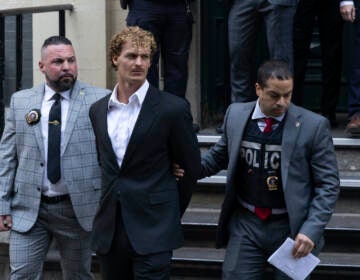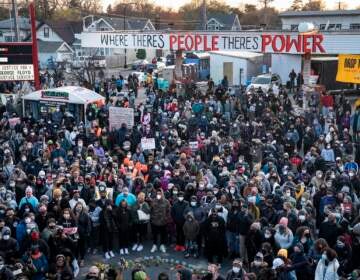Thinking of joining a protest? Here’s what to know before you take the streets
Attending a protest is empowering. It can also be overwhelming for people new to protests. It's important to be well-informed.
-
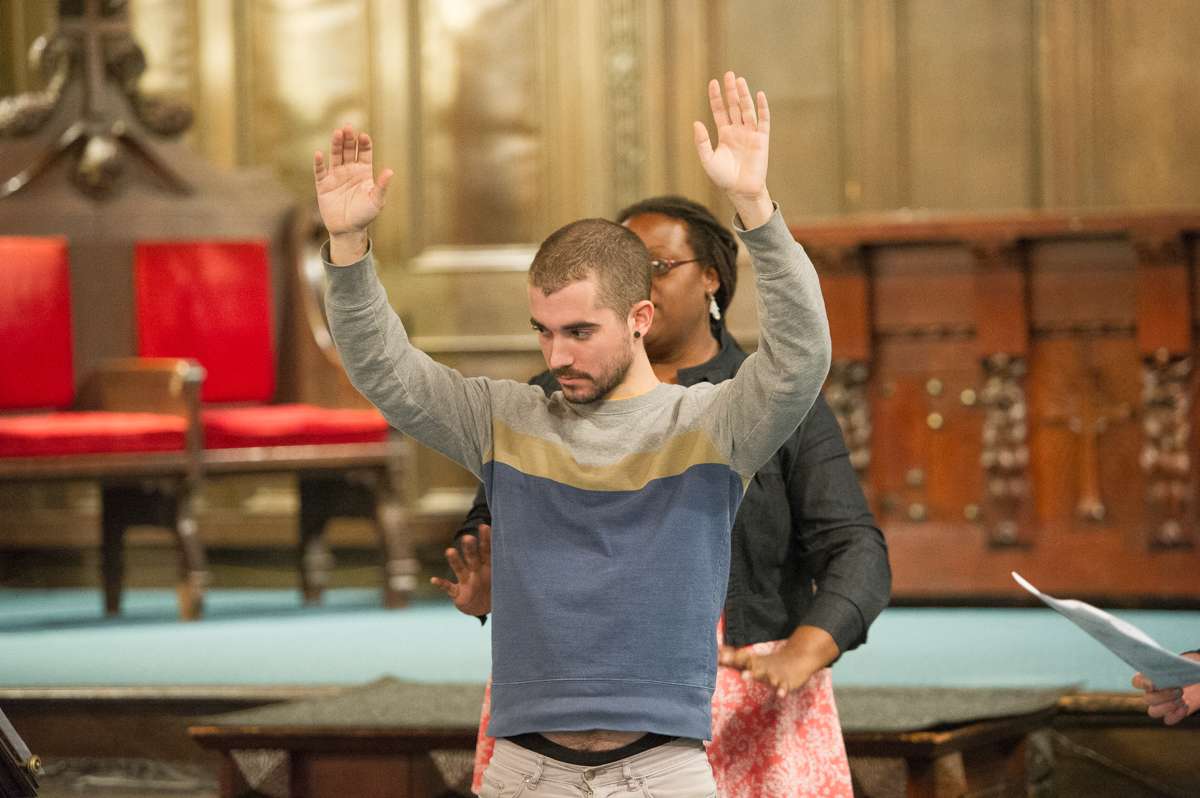
Members of Up Against The Law Legal Collective demonstrate police limitations when frisking detainees at a know-your-rights training at the First Unitarian Church of Philadelphia. (Jonathan Wilson for NewsWorks)
-
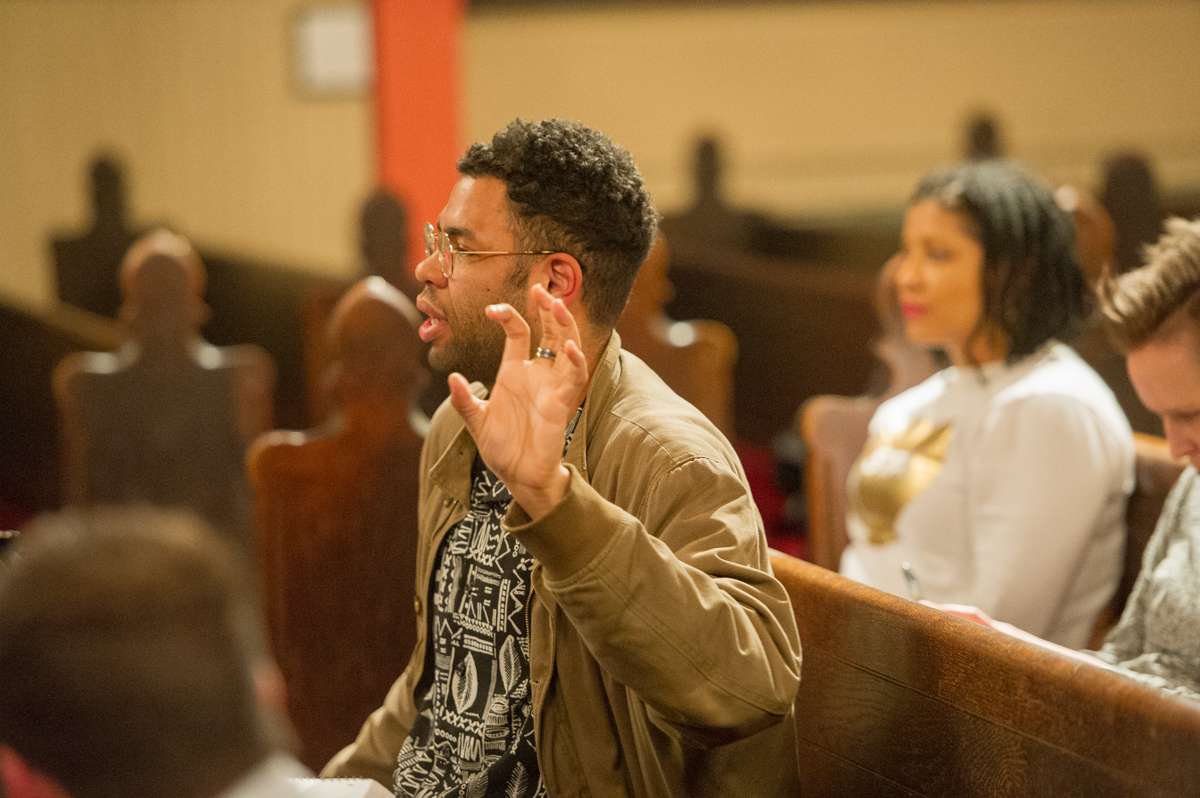
Rick Kravewski asks for clarification of protesters' rights during demonstrations at a know-your-rights training at the First Unitarian Church of Philadelphia. (Jonathan Wilson for NewsWorks)
-
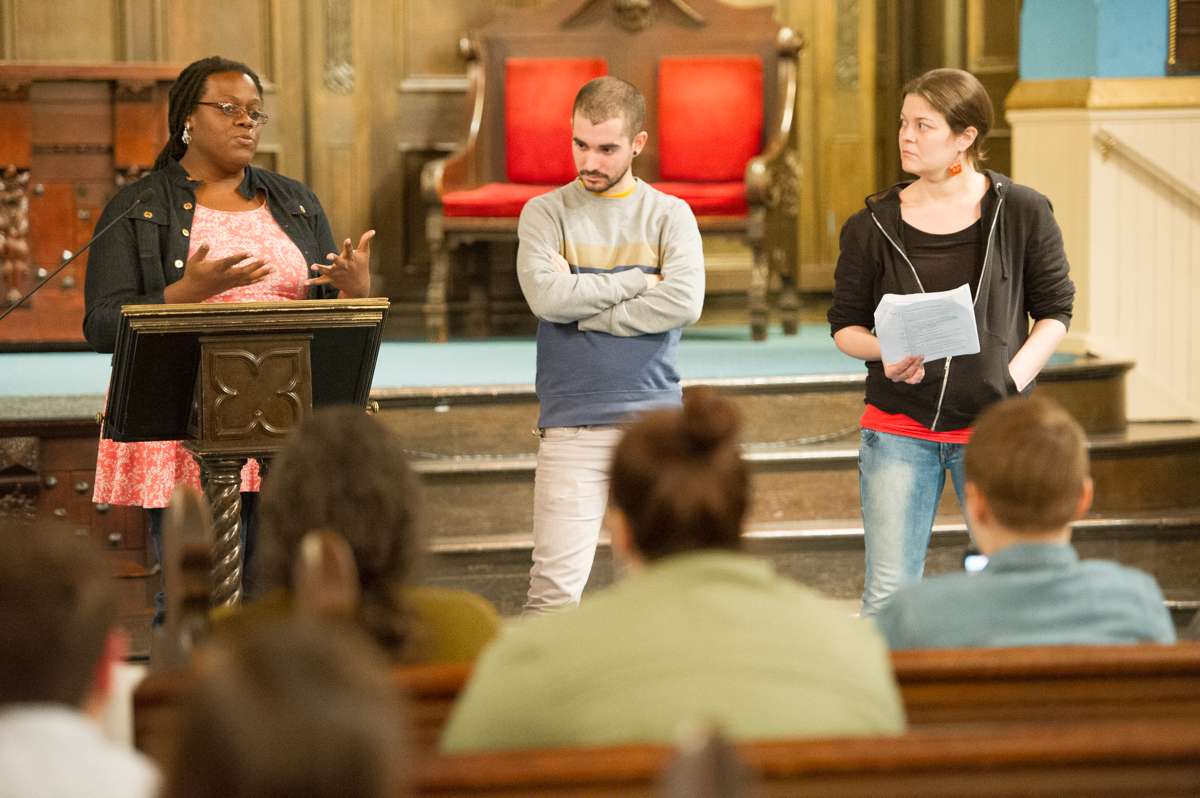
Members of Up Against The Law Legal Collective explain policing practices and protesters' rights during a protest workshop held at the First Unitarian Church of Philadelphia. (Jonathan Wilson for Newsworks)
-
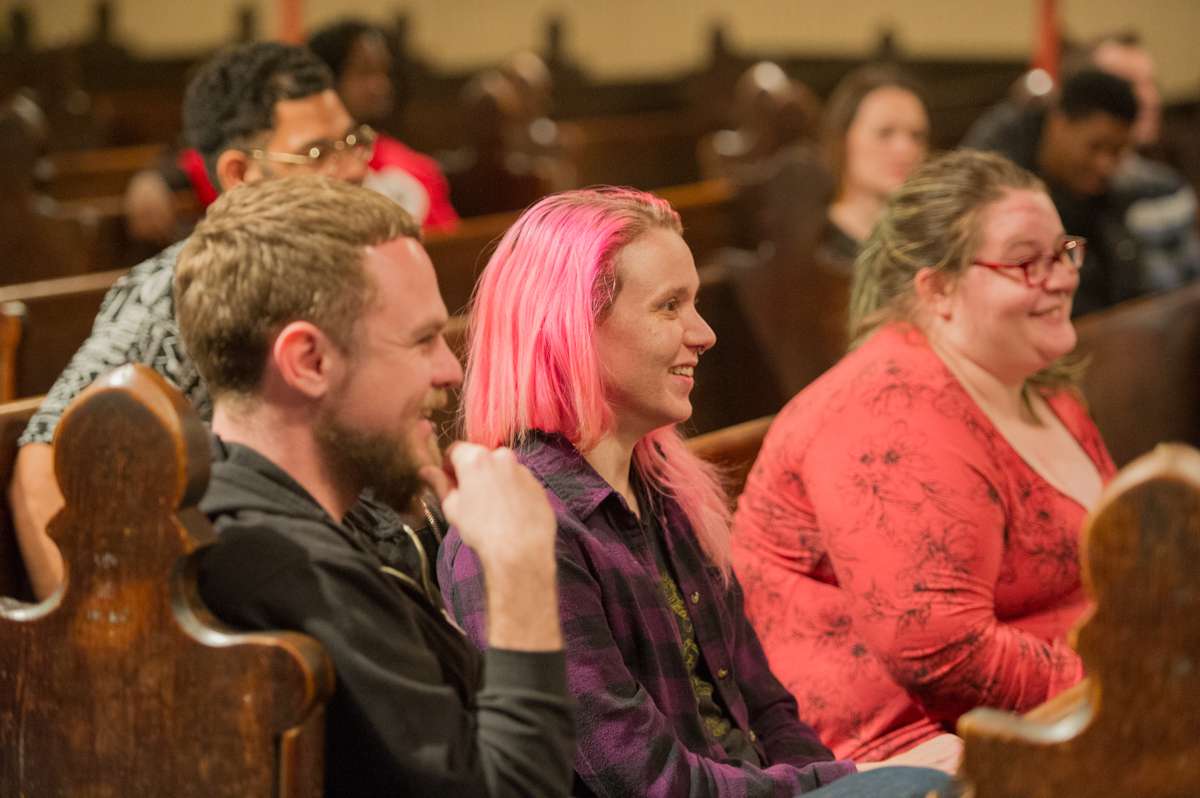
Attendees listen to members of Up Against The Law Legal Collective explain protesters' rights at a training at the First Unitarian Church of Philadelphia. (Jonathan Wilson for Newsworks)
-
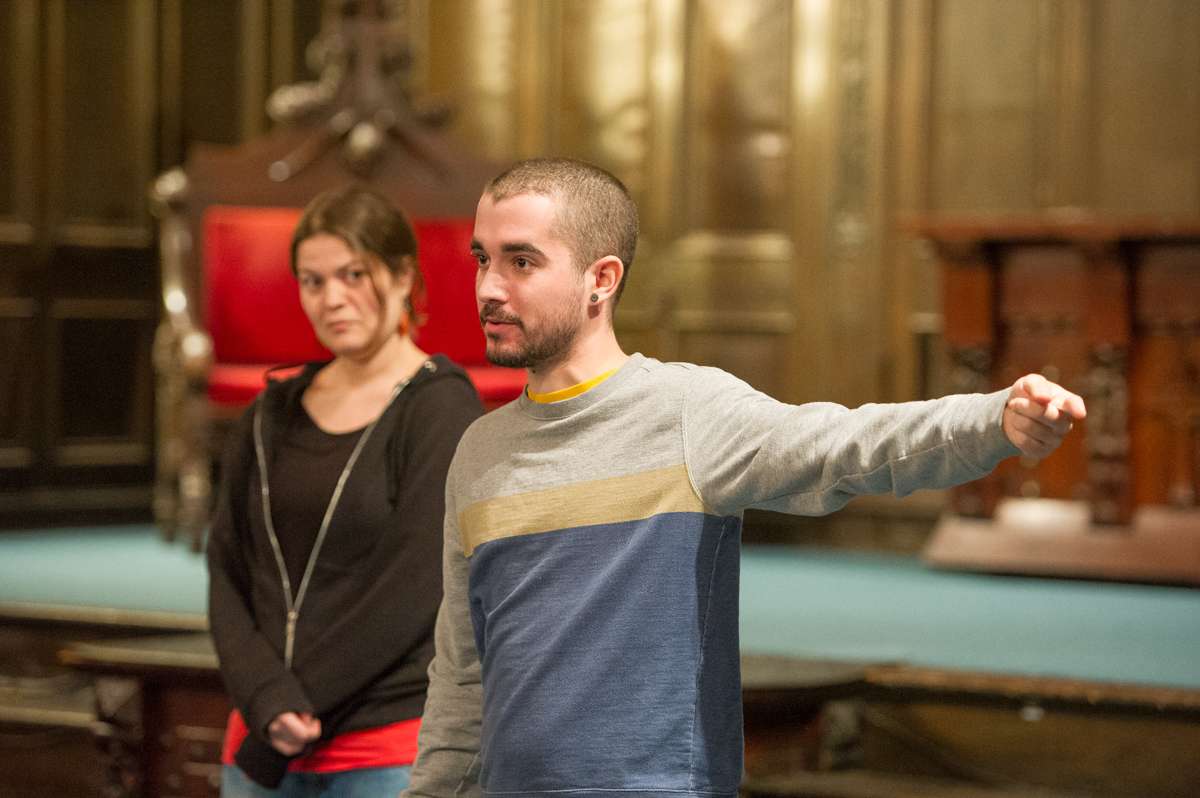
Tory Smith, a member of Up Against The Law Legal Collective, explains policing practices and protester's rights at a protest workshop. (Jonathan Wilson for Newsworks)
Attending a protest is empowering. It can also be overwhelming for people new to protests. We are taught our entire lives to follow orders, so being disobedient and disruptive can be fraught with both excitement and anxiety. It’s important to be well-informed.
When you take the streets with other people, there will probably be lots of cops — on bikes and motorcycles, in cars and vans, with flashing lights. Stay close to your fellow marchers, and don’t let the police intimidate you. They might not want you to march down a particular street. They may caution you to stay on the sidewalk. You have a protected first amendment right to take to the streets and raise your voice, regardless of their wishes, with or without a permit.
It is the role of police to manage crowds and maintain the status quo. However, most successful protest movements are disruptive: They snag traffic, disrupt meetings of the powerful, and interrupt business as usual. This often brings protesters into conflict with law enforcement.
‘Don’t talk to the police’
First and most important: Don’t talk to the police. This may feel counterintuitive, but chatting with the police may alienate you from people who have been historically targeted by the police. They may see you as more interested in building a rapport with officers than with your fellow demonstrators. The Philadelphia Police Department has a Civil Affairs unit. These units evolved out of the “Red Squads” of the ’70s, which surveilled the civil rights and antiwar movements. They exist to shepherd demonstrations and gather information on activists.
These plain-clothes cops often wear dapper suits and orange arm bands. They’ll sometimes smile and try to make small talk. That’s their job. Regardless of their demeanor, they are not neutral. The cops are not on your side when it comes to social change.
At times they have been known to spread rumors and try to pit protest groups against each other. This was a common during Occupy Philadelphia, where the police officers and other city officials built rapport with some Occupiers and told them that “anarchists” and “radicals” in the camp were preventing the city from having a positive relationship with Occupy.
A legacy of distrust
We still live under the spectre of former Philadelphia Mayor Frank Rizzo. While the Civil Affairs cops might seem friendly, remember that they are part of the Philadelphia Police Department, which has a legacy of abuse and extreme violence toward the city’s poor, black, and brown communities. It was only 32 years ago that the PPD dropped a fire bomb on MOVE, which killed 11 people and destroyed an entire city block in a black neighborhood. Through stop-and-frisk and other heavy-handed measure, they generally terrorize the city’s most vulnerable communities.
In neighborhoods such as Kensington, cops have been known to round up everyone hanging out on a block, line them up, go into their pockets, and smash people’s phones if they try to record it. During a stop-and-frisk, cops are only supposed to touch the outside of their pockets unless they feel a weapon. There are cops who plant evidence. There are also cops who, without justification, shoot and kill black men like Brandon Tate-Brown.
Some basics
There are a few basic things to consider when going to a protest for the first time: Bring water, layered clothing, and sunscreen. You might be on the streets for a while. Be safe — let your friends and family know where you will be, and have a plan in case you are arrested: Who will feed your cat, call your mom, fill in for you at work, etc.?
If things at the demonstration get tense and the police corral you, ask them “Am I being detained?” If the answer is “no,” then you are free to go, so simply walk away (while checking to make sure everyone else around you is also safe and free to leave — we are all stronger when we support each other).
There are also things to know for non-protest situations as well when interacting with the police. In Pennsylvania you are not required to show ID, though cops will often tell you otherwise. They are lying. Cops lie all the time. The U.S. Supreme Court held in Frazier vs. Cupp, 1969, and it has been upheld in subsequent rulings, most recently by the 9th Circuit Court, that police can “deceive with false information.”
Conversely, it is “illegal” for you to lie to cops, so if you are detained, you should never give them a false name. Do not tell the police what you did, who you were with, or where you were. If you are arrested, the only thing you should say is “I’m exercising my right to remain silent, and I want to speak to a lawyer.” If they ask you for your name or your address, that’s fine, but don’t talk with them about anything else. They might lie to you and imply they’ll “go easy” or let you out if you cooperate. Don’t be fooled. Certainly never give the police information on others.
If you do go to jail …
In Philadelphia, the police usually give several warnings before they arrest protesters. They can hold you for up to 48 hours before deciding whether to pursue charges, but usually it’s just 12 to 24 hours. Lately, most activists are not required to post bail and are released on their own recognizance, which means they agree to show up for their court dates. In many cases, people are just given citations and released after a couple of hours, but it’s always best to be prepared for the worst.
While in jail, don’t talk about what you or others “did,” because police listen to those conversations. They record any phone calls you make. (There’s no inherent right to a phone call, though usually it’s allowed from a payphone, so have change on you.) Remember, you are not alone. There are top-notch lawyers, with a long history of supporting Philadelphia social movements, who have your back.
The vast majority of people in jail don’t have support from organized movements. Undocumented folks, people of color, transgender folks, and others who are socially marginalized are far more vulnerable to state violence. Don’t throw them under the bus. If possible, don’t let them separate you while in jail. If people are being disproportionately targeted by the police, either on the street, or in jail, show them solidarity. This is an organizing opportunity — use it!
How you can show support
If your comrades have been arrested, organize jail support. Go to the place they’re being held with a large group of others and stand outside. Make noise. Have food, water, cigarettes, and hugs ready when they’re released.
If you are arrested, subject to police violence, or you witness arrests and police violence, document it. Take photos and videos. Get people’s names and, if possible, officers’ badge numbers. Find out detainees are being taken. It is OK to ask the police this (and they usually will tell you). You are allowed to observe and record the police while they are on duty. If they stop you from documenting it, you can file an official complaint. Remember too that if you are more “privileged,” you can push that line further than other folks might be able to. That’s also solidarity.
People who gather for social movements are in it together, and we all have different roles to play. Protesters’ rights are routinely violated. Movements are made stronger when people know their rights, vocalize them, and document when they are violated. The state tries to stifle our rights and knowledge of them. They know that solidarity is our most powerful tool.
—
Sean ‘Wispy’ Damon and Nathaniel Miller are members of Up Against the Law Legal Collective, a Philadelphia-based collective of activists who are lawyers, legal workers, and community members, born out of the Occupy movement and dedicated to empowering communities. UATL provides Know-Your-Rights trainings, legal training and support to activists, observation during protests and demonstrations, and legal, jail and court support.
WHYY is your source for fact-based, in-depth journalism and information. As a nonprofit organization, we rely on financial support from readers like you. Please give today.


